«Blessed is he who visited this world in its fateful moments...»
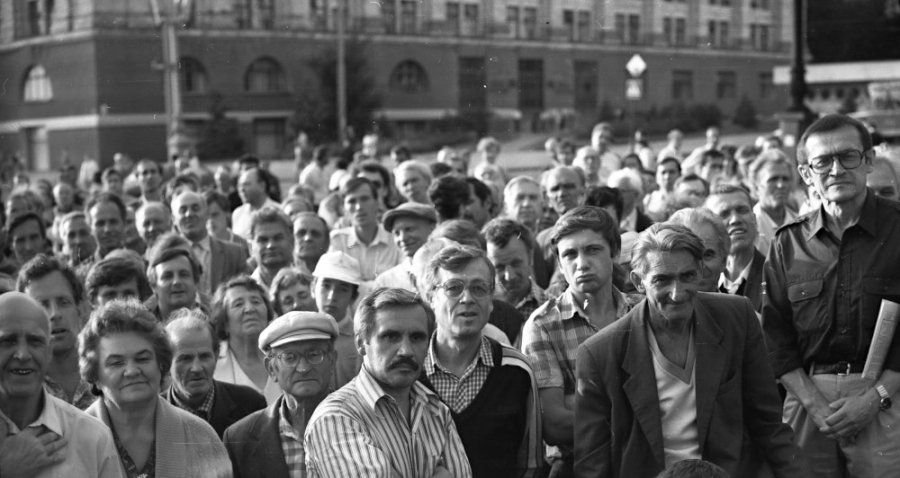
August 1991: the short chronicle of events
Dedicated to the blessed memory of Henrikh Altunyan
On Monday, 19 August 1991 I had the first day of my vacation. The day before I was poking around in my garden, preparing potatoes for digging. On 19 August I had to go to work – to approve a new staffing schedule for the bureau that I was in charge of, and that’s it, a chance to get distracted.
Since childhood I have been idiosyncratic to all mas media, therefore, there was no TV or radio at my dacha. That is why I learned about the putsch only at 11 o’clock, when my wife, son and mother arrived. The first to arrive was Borya shouting: “Coup d’état!”. I thought that he was kidding me. But then my wife and mother arrived with their eyes wide open, and I understood that it was not a joke.
I remember the first feeling well – the limitless surprise. How could they decide? It is absolutely unnatural, sheer idiocy! The second feeling – they won’t succeed, they will fail! I tell this to my relatives. – they answer “Well, you were always a clinical optimist!”. I thought about my close friends in Moscow – Larisa Bogoraz, Sanya Daniel, Pashka Marchenko – where are they now, what is going on there.
My mom and my son remain on dacha, to look after our dog who once again gave birth to many puppies (last time she managed to give birth before the elections to Ukrainian Parliament, 14 puppies! – And on the day of elections, early in the morning, Henrich Altunyan and I went to the market to sell them), and my wife and I go to the city.
I arrive at the office around 2 pm. everyone’s faces are grim, the mood is like on funeral. Nobody makes eye contact. I say to my colleagues in the bureau – “Why are you so blue? It will only last two or three days, no longer! A week at maximum!”. Two or three smiled, others keep silence grimly.
What to do? I call Henrich, he does not know anything except announcements on TV and radio. Nobody knows anything. It is hard to believe now, but back then the information on what’s going on in the country was hard to receive even to the authorities. In the City Council (I was a deputy of the City Council back then) everyone is grim, scared, nobody knows anything.
I call Moscow, “Express Khronika” and the Social Information Agency. Everyone is invigorated there, morale is up. They tell me about the transpiring events. I give the fax number of Altunyan (good job, he likes technical novelties, he managed to get one!), ask to send the information and run to him. We received two three-meter “blankets” from both sources – reports of country-wide protest rallies, Yeltsin’s statement. Henrich with one “blanket” went to City Council, I went to the office where I had timeshare access to mainframe computer, good thing it is not far from Altunyan. I typed and printed the text of Yeltsin’s statement and went to the rally on the central square near the entrance to “Universitet” subway station. They say it started at around 11 am and does not stop. There are around 100 people. Many “democrats” in plainclothes. It’s as if they have a stamp on their faces, they stand out.
Actually, I’m not a fan of speaking at rallies, but there was no way out, I had to. moreover, many usual speakers were absent.
So, I speak, give the information about events, read Yeltsin’s statement. Everyone is very attentive, some express joy. Those in plainclothes are surprised. Is that news even for them? I say again that the Committee on State of Emergency (CSE) will last no more than a few days and this is where I finish. I give out leaflets with the text of Yeltsin’s statement.
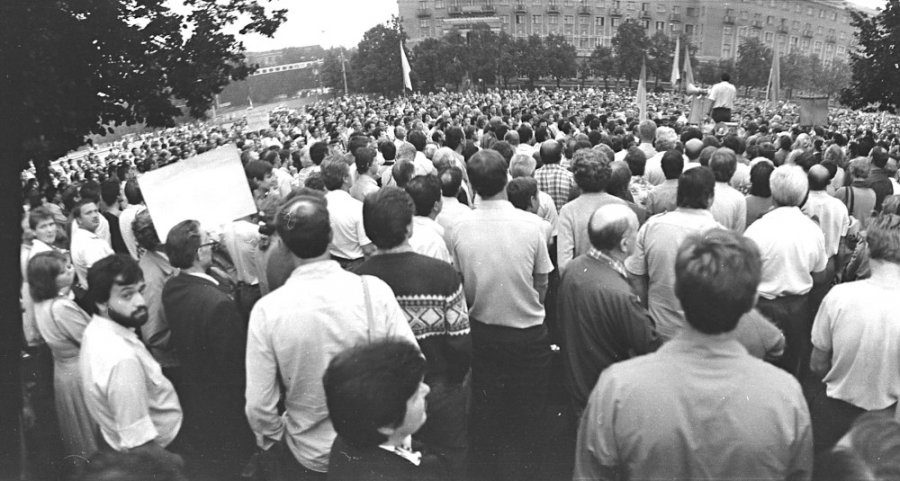
I call Henrich. He tells that after receiving the information in the City Council the people calmed down. Yevgeniy Kushnaryov (he was the head of the City Council back then) overcame his fear, got ready, acquired his usual – dignified and proud – look and decided to convene an emergency session of the City Council. We cannot do it on Tuesday – so, we’ll do it on Wednesday. The Head of the Region Council, Oleksandr Maselsky, on the contrary, dismissed the session scheduled in advance for 20 August – “We need to gather bread”. Altunyan tells that Oleksandr Stepanovych in the afternoon flatly refused to disperse the rally in the square. In a word, the Ukrainian authorities are acting in the spirit of Kravchuk’s statement.

I wrote the text about that day’s events in Kharkiv and dictated it over the phone to “Express Khronika”. I call Larisa. She says that both suns, Sanya and Pashka, are near the White House. Late in the evening I calm down the fellow deputies who visited us at home to learn what is known. They spent the entire day at home, afraid to go out.
The next day passes in worried waiting: what happens in Moscow? How will the army react? I run between Altunyan’s fax and the rally in the square, provide the information on the events. In the evening my wife and I visited the dacha – to calm down my mother and son. We returned very late.
In the morning I learn about the clash in Moscow, three deaths. I am worried. I go to the meeting. Several deputies suggest to condemn the actions of CSE. Two speak against it. One statement by the Deputy Head of the regional KGB, Pyerevyerzev. He virtually supports the putsch. Grigorieva, secretary of the Chervonozavodsky district committee of the CPSU, says that there is no need to provoke young people and that we must wait for the decisions of the central authorities.
However, the meeting decides to condemn the illegal actions of CSE. The communist faction votes against it.
I remember the next two days worse. I only remember well the heady feeling of freedom that I had back then. There is no informational blockade any more, everyone is glued to the TV. Kushnarev again convenes an emergency session of the City Council on Monday, 26 August. Stanislav Gurenko at the session of the Verkhovna Rada swore that the Communist Party of Ukraine knew nothing about the putsch.
At about 8 am on Saturday my friend calls me (too bad I can’t remember, who exactly): hurry to the regional committee. They burn papers, a crowd gathered, wants to thrash it. Regional Committee is five minutes walk from my home. I come running immediately. There is a crowd of about 60 people, someone unfamiliar uses the loudspeaker. Behind the closed doors the faces of the policemen from the security service, white of terror. I was recognized in the crowd, they show me: there is smoke coming from the third floor windows. Really, there is something that looks like smoke. I think: if they wanted to burn something, they would do it long ago. I take the loudspeaker and suggest not to be reckless, not to break the entry of the Regional Committee, and rather to choose a group of five men from those present who would peacefully enter and check what is being burned, where etc. The people agreed, we decided who would go. I ask the crowd to move away from the entry, I knock and show my deputy ID, I ask to open and state our intentions. The scared guards say that they cannot let anybody in without the management and that they were going to call the first secretary of the Regional Committee, Anatoliy Myalitsa. Two Regional Committee employees in the regular uniform – dark suit, white shirt, a tie, leave the building, the crowd meets them with hooting. They barely manage to walk through the crowd and run away. Thanks God, there was no fight.

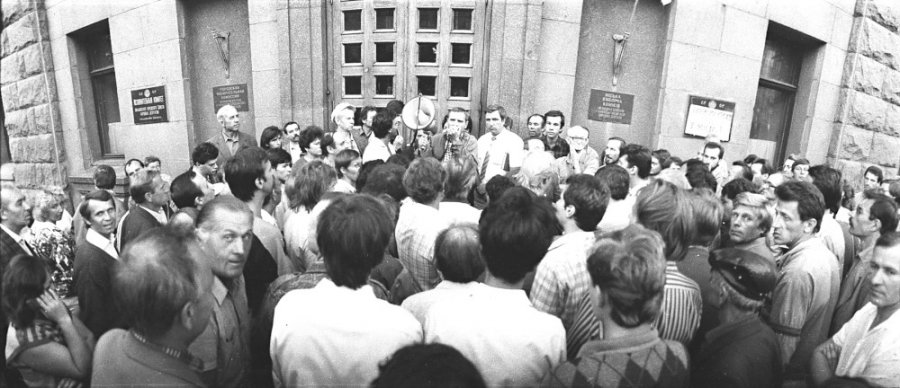
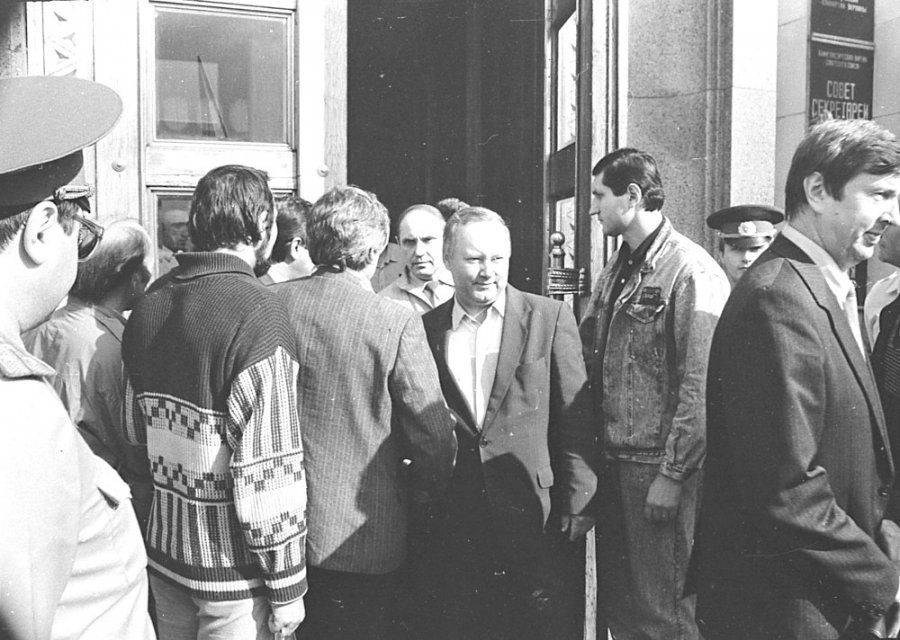
Some time later Myalitsa comes out. The people surround him, shouting and hooting. I enter the discussion with him, state our intentions. He agrees, but asks the crowd to move away, because he cannot speak to everybody at once with such shouts. I ask people to move away a bit. They do it. Myalitsa and I remain together, he starts to twist and object. An excellent demagogue! I argued with him for about 40 minutes. The crowd approaches, losing patience, he at once agrees to everything, asks me to tell the people to move away, and as soon as they do – again starts to twist. Suddenly a car arrives, Kushnaryov and Altunyan leave it, they have just arrived from Kyiv. Kushnaryov says: “We are going to seal the Regional Committee – a decision of the Regional Executive Committee is going to be taken soon. Yevgeniy Yefimovych, I ask you to join the sealing commission. Take two more deputies”. He leaves, while Henrich stays and tells that during the night in Lviv the crowd burst into the Regional Committee of the party and found there a telegram from the Central Committee of the Communist Party of Ukraine of 18 August, addressed to the party bodies of Ukraine, with the description of measures that are to be taken by the party bodies under the directives of CSE. The Regional Committees are to be sealed so that the documents do not disappear. I offer Seryozha Vladimirov and Sasha Novikov, fellow deputies, to go on with sealing.

Myalitsa goes grey and no longer argues. He goes inside the building of the Regional Committee. Some time later we are joined by regional council deputy Alexander Priymak, who was included in the commission from the regional council, and imperturbable police captain Bondarenko (I think, his facial expression never changed in all two and a half hours). The five of us begin the procedure. I enter the Regional Committee building for the first time. Carpets, marble, cleanliness. We go through all rooms on all floors, sealing them. We were accompanied by photo correspondent Nina Bezhina, she tirelessly took pictures of everything. The employees of the Regional Committee leave the building. The crowd that grew significantly since morning meets every employee with whistling and hooting. Finally, we leave the building and seal the front door. I was the tallest, so I raised the paper strip with the seal as high as I could and glued it on. The crowd roars of joy. The noise is incredible, the shouts, whistling. Myalitsa is next to me, he struggles to lock the front door with a big key and fiddles it around, as if not knowing what to do with it. I grab the key from his hands and say that it would be better if it remains with me. Myalitsa protests, I do not give it back. The crowd shouts. Then Myalitsa agrees, but on one condition: I will bring the key to him on Monday at 8 am. I agree and Myalitsa leaves, accompanied by whistling and shouting.

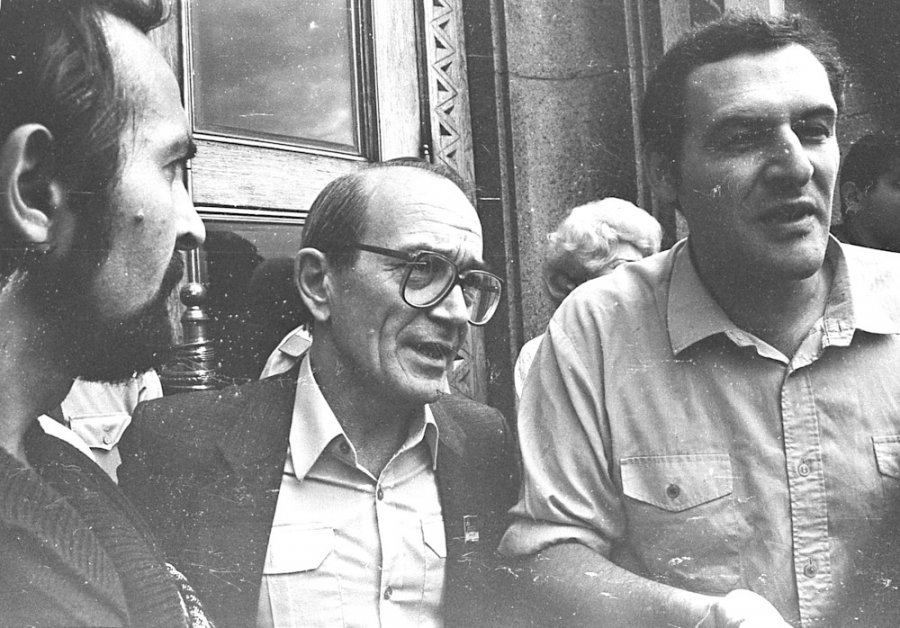
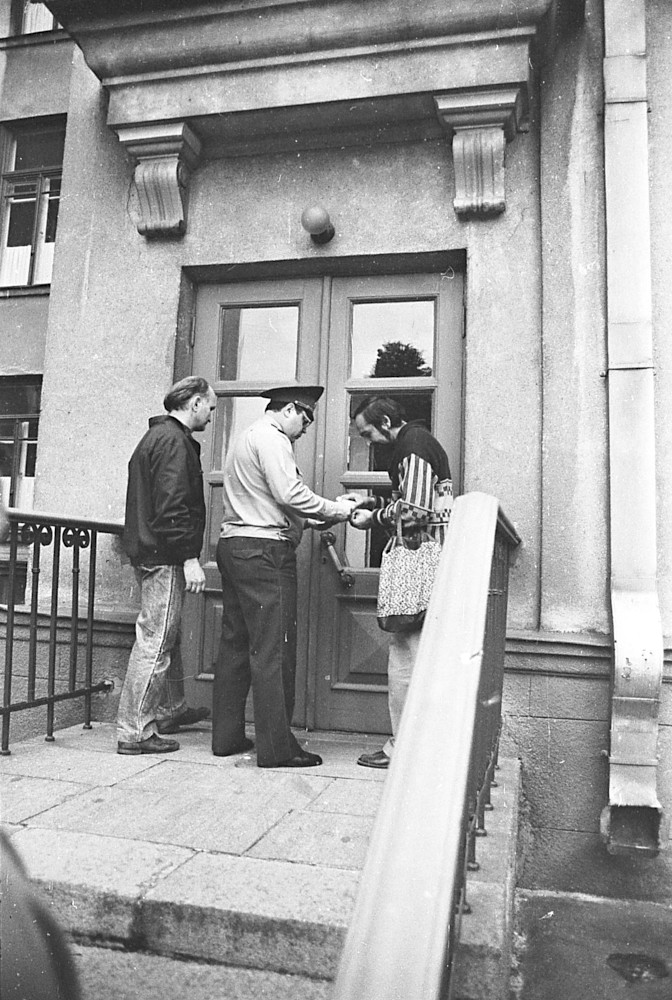
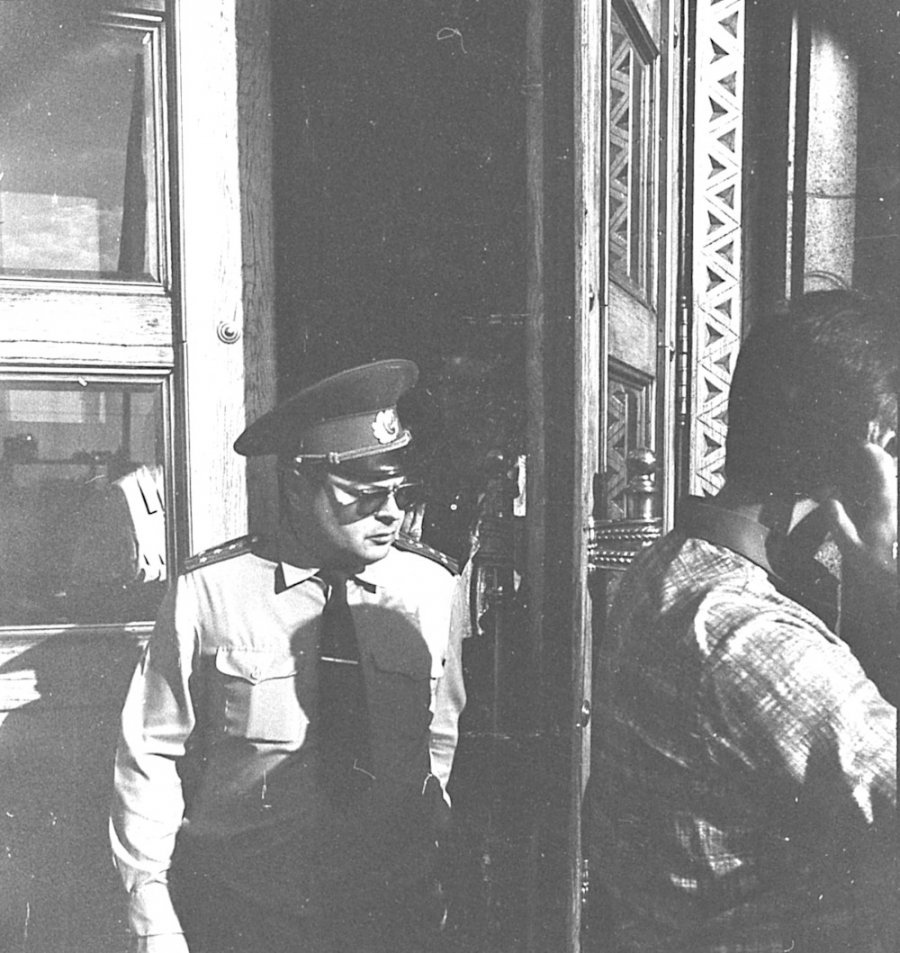
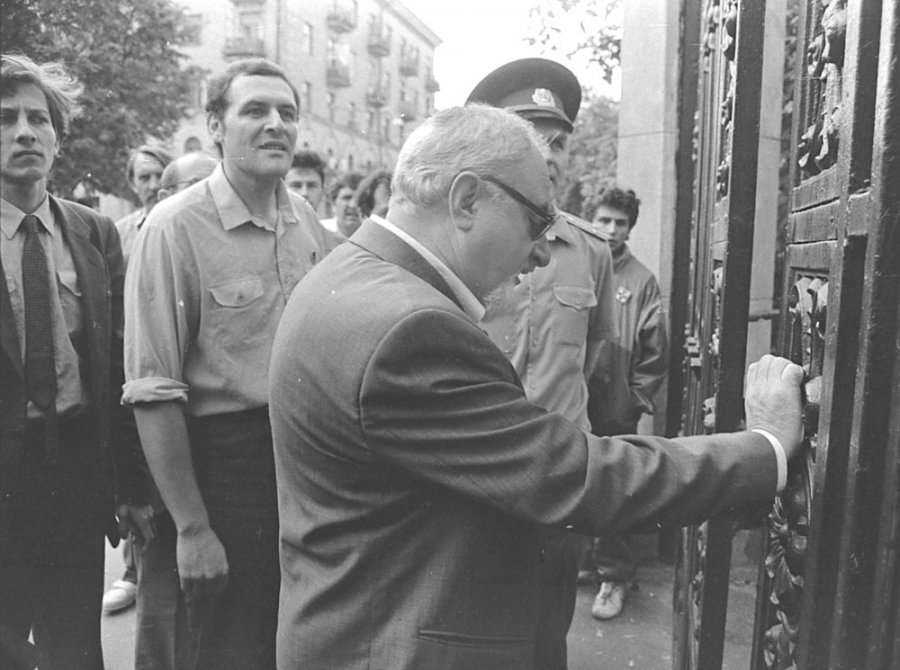
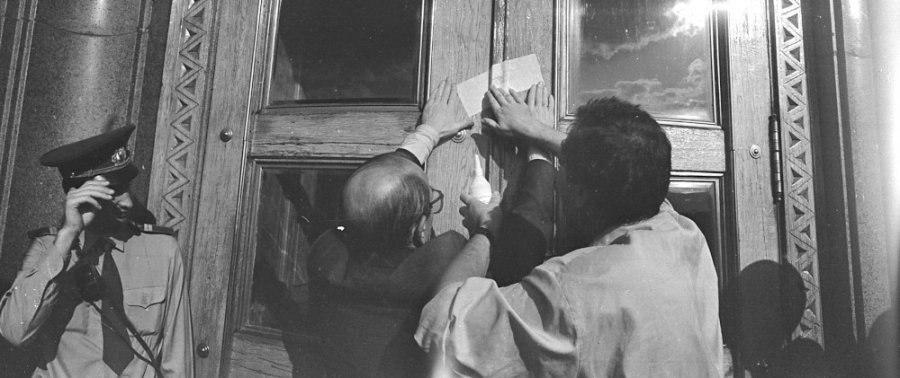
I remember well a weird feeling that overcame me: I am holding a key which was probably not used since the day the Regional Committee entered the building after it was freed of the Wehrmacht. I do not want to return it to Myalitsa on Monday. A handsome slim grey-haired Colonel approaches me, Head of the Public Order Protection Department of the City Department of the Ministry of Internal Affairs. I cannot remember his surname, I think, he was called Andrey Andreyevich. He tells me, “Listen, could you disappear with this key, so that nobody would find you?”. Police hates them, too. Nina Bezhina suggests to photograph me with the Regional Committee key. I refuse, feeling awkward. Then she asks to at least photograph the key in my hands, I agree. Later that photo of the key in my hands was in all Kharkiv newspapers.
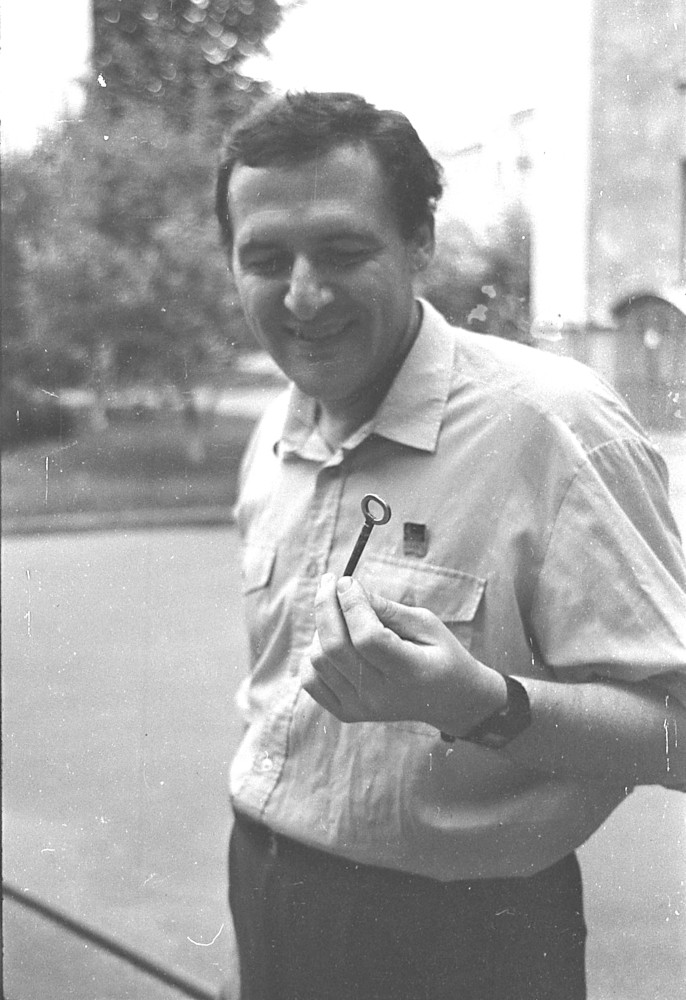
All Sunday I spent thinking how to avoid giving that key to Myalitsa. Late in the evening I learn that a decision has been made by the Presidium of the Verkhovna Rada to ban the Communist Party. Early in the morning I call Kushnaryov at home, tell him about this decision and suggest not to give the key under this pretext. He agrees, promises to stop by the Regional Committee by eight. He drives in, tells Myalitsa about the ban on the Communist Party of Ukraine, takes the key from me. After that the Regional Committee and other party buildings and property were dealt with by the liquidation commission.

On the meeting all decisions are taken unanimously, almost all communists vote in favour, with their heads down, looking at their feet. Commissions are created to liquidate party bodies, to investigate the facts of the execution of illegal orders of the CSE, Dzerzhinsky Square is renamed Svoboda Square, streets are renamed, subway station... And only once the communists shrugged, raised their heads and voted “against” – when the proposal was put to the vote to remove the monument to Lenin from Dzerzhinsky Square. There were not enough votes, I think, three or something, and the decision was not taken – the only one. So the monument remains[1]. Miroslav Marinovich, having first arrived in Kharkiv in November 1993, said: “How symbolic it is: a monument to the strangler of liberty on Liberty Square!”
During the break in the meeting Kushnaryov asks me to head a commission to investigate the facts of the execution of illegal orders of CSE. “You know our “democrats”, they will do so many stupid things now!”. I agreed to enter the commission, but refused to head it. I suggested that it should be led by Oleksandr Novikov. Kushnaryov agreed. The meeting voted and on the same day the commission began working.
There were many interesting details, but I cannot talk about it now. I can only say that I very strongly objected to the commission considering anonymous applications, and I managed to convince my fellow deputies. In a week’s work in that commission, I had to seal several party buildings, speak with party Heads of various ranks. We have managed to find that telegram of 18 August and control how it was implemented. The further those instructions went from Regional Committee, the less willing were the party workers to implement them. The District Committees developed measures to support CSE, transferred them to the party committees of the plants and enterprises, and on the level of the primary party organizations it all sank and was lost. In a word, CSE did not receive any support. Its activities were so unnatural that they were doomed to fail.
The failed putsch turned out to be a catalyst for the disintegration of the USSR. The communist majority in the Verkhovna Rada surrendered and supported the Declaration of Independence Act, seeing this as a lesser evil than exporting the revolution from Russia. Ukraine suddenly became independent, being largely unprepared for this.
I often think: could we achieve more if we all acted differently? I do not know the answer to this complicated question. History does not tolerate the subjunctive mood. It seems to me that Ukrainian society was unprepared for abolition of the Communist ideology, not prepared to remove from power those who participated in repressions against dissidents, to replace the nomenclature. There was not a critical mass of people who could implement it all, – the society was very weakened by the constant repressions that lasted for 70 years. There was no understanding between people in the East and West. It is not for nothing that on 1 December, the Ukrainian people voted for the main ideologist of the Central Committee of the Communist Party of Ukraine, Leonid Kravchuk, and not for the former dissident Vyacheslav Chornovol. In a word, in my opinion, a quick start, as in Poland, the Czech Republic, Hungary, was impossible with us. Alas, we were doomed to those difficult ten years that we lived after August 1991, to slowly and painfully go through the post-totalitarian depression, also burdened by typical Ukrainian phenomena. Nevertheless, in these years there were also bright moments, and positive changes accumulated. Despite all the difficulties and negativity, which were in abundance, the general vector of changes in the country, in my opinion, is directed towards the better, and further results will depend primarily on ourselves.

I wrote this in August 2001 and, I think, I was not wrong.
Photos provided by Kharkiv Literary Museum
[1] It was taken down in 2014.





